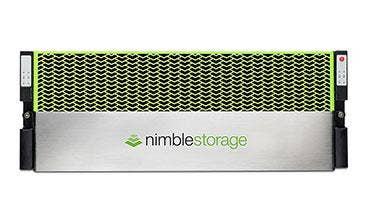Nimble Storage Intros New Entry All-Flash Array, Refreshes Hybrid Array Line

Flash storage solution developer Nimble Storage this week unveiled a new entry-level, full-featured, all-flash storage array with a starting street price of under $40,000.
Nimble Storage also said it has completely refreshed its hybrid flash array line to include significantly higher performance and lower cost, said Gavin Cohen, head of product marketing for the San Jose, Calif.-based company.
The release of the company's new entry-level, all-flash array comes just six months after Nimble Storage, best known for its hybrid flash array solutions, unveiled its first all-flash arrays.
[Related: IDC: All-Flash Storage Array Sales Soar In First Quarter, Enterprise Storage Sales Stumble Badly]
Since that launch, all-flash arrays accounted for 12 percent of the company's total array revenue, Cohen told CRN. He could not yet comment on growth in this quarter because Nimble Storage, as a public company, has yet to report the figures.
Nimble Storage's new AF1000 can scale to up to 165 TBs of flash storage capacity in a 4U enclosure, or up to 2 petabytes effective capacity and 350,000 IOPS in 12U of space, Cohen said.
The starting end-user price of under $40,000 includes 11 TBs of raw capacity, three years of support, and the full range of storage services Nimble Storage provides for its other systems, he said.
It also includes an all-inclusive software license with flat support pricing and no forklift upgrades required. Customers can also purchase Nimble Storage's Timeless Storage package, which offers customers a three-controller upgrade after three years.
As the cost of flash storage continues to fall, it is possible that all of a customer's storage will go to all-flash arrays, said Alan McDonald, president and CEO of All Connected, a Simi Valley, Calif.-based solution provider and long-time partner of Nimble Storage.
"Vendors keep driving the entry point of all-flash arrays lower," McDonald told CRN. "This gives us an opportunity to have new conversations with customers."
The need for entry-level, all-flash arrays is growing, McDonald said. "When you go to all-flash, latency issues go away," he said. "This is important for customers with shared workloads. The AF1000 opens opportunities in smaller businesses than ever before."
Nimble Storage this week also refreshed its hybrid flash storage array lineup with new hardware that offers almost double the performance at about 40 percent lower cost for capacity compared to the existing line.
At the high end of the new lineup, the new CS7000 provides up to 230,000 IOPS and scales to over 2.4 petabytes of effective capacity, Cohen said.
More importantly, the new line of hybrid flash arrays supports Nimble Storage's Timeless Storage program, and is now "dedupe-ready," Cohen said.
"They already ship with compression technology," he said. "In-line deduplication is coming. No other hybrid flash array vendor does dedupe well now, as most arrays are too slow."
The four new models in the hybrid flash line allow non-disruptive scaling up to the next model in the line as customers' needs grow, Cohen said.
McDonald said there is still strong customer demand for hybrid flash storage systems, depending on the performance needs of their applications.
"Thirty-five percent of our business is in education," he said. "A lot of data here doesn't need the higher performance of all-flash arrays. It can sit on tier-three spindles. Same for customers with a lot of video files they don't touch. But if they have applications with performance or I/O issues, you add a hybrid array and you not just get improved performance. The issues just go away."
Refreshing Nimble Storage's hybrid array line is important because, while every customer's buying cycle is different, every vendor brings out new platforms, McDonald said.
"It's important to give customers a migration path without requiring a forklift upgrade," he said. "And with Nimble Storage's new controllers, customers can get non-disruptive upgrades."